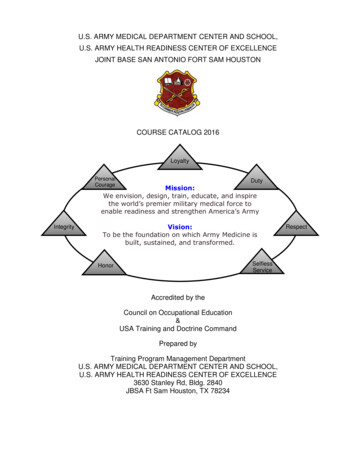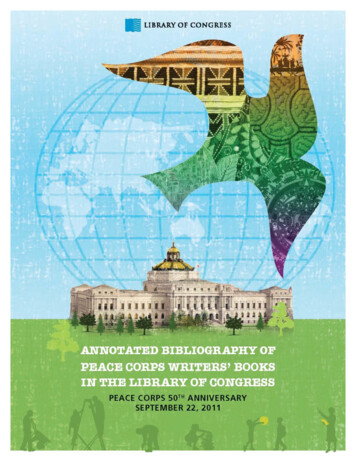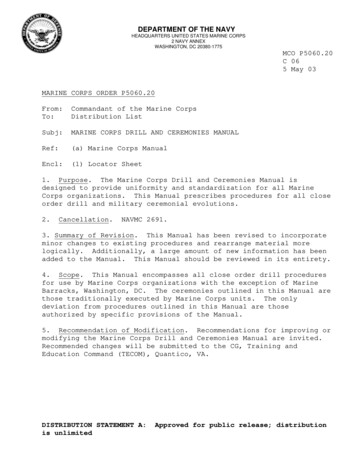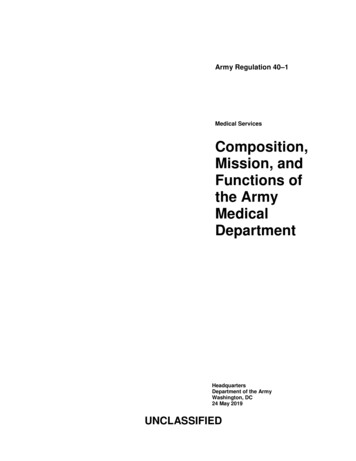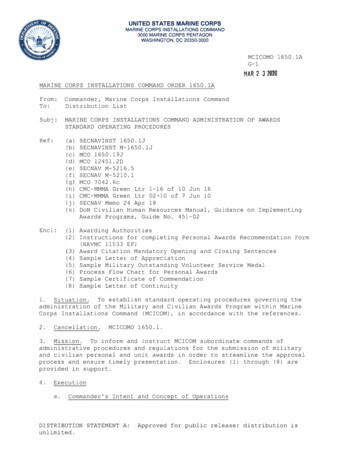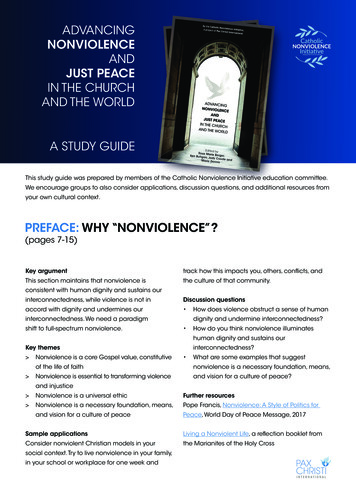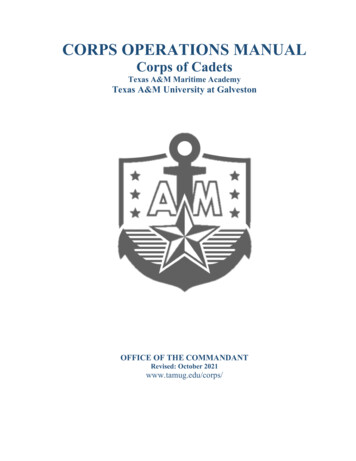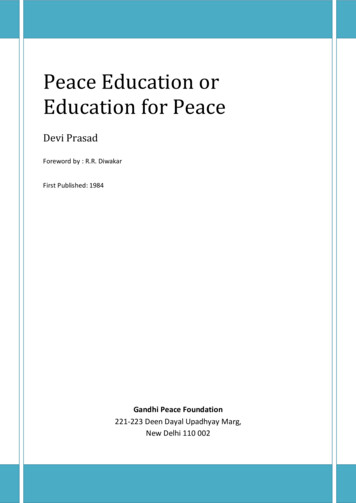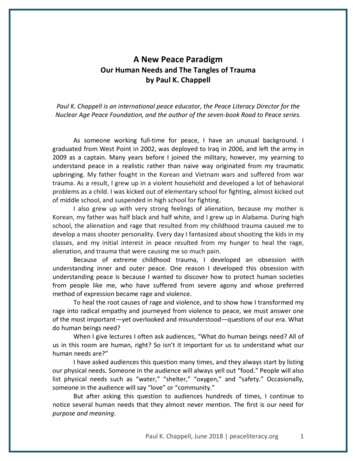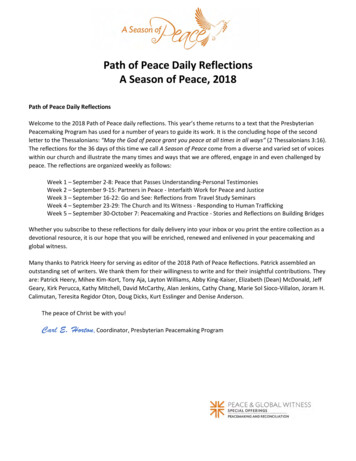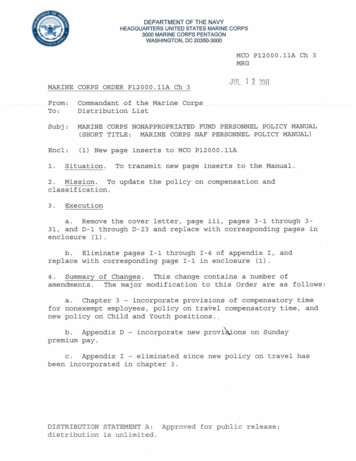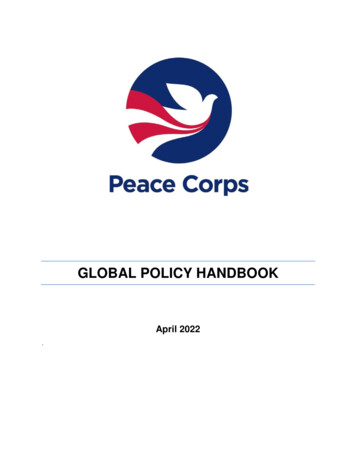
Transcription
GLOBAL POLICY HANDBOOKApril 2022.
Table of ContentsSECTION 1: INTRODUCTION . 1OVERVIEW: GLOBAL POLICY HANDBOOK . 1THE PEACE CORPS MISSION. 1SECTION 2: TRAINING AND SWEARING IN . 2QUALIFYING FOR SERVICE . 2OATH AND PLEDGE . 2SECTION 3: EXPECTATIONS FOR VOLUNTEER CONDUCT. 3ROLES AND RESPONSIBILITIES . 3Core Expectations . 3Professionalism . 4DISCIPLINARY ACTION . 4ALCOHOL . 5CHILD PROTECTION CODE OF CONDUCT. 6COMPLIANCE WITH U.S. AND LOCAL LAWS . 7DRUGS . 7Unconfirmed Allegations or Rumors . 7Voluntary Self-Referral . 8ETHICS AND FINANCIAL GAIN. 8FIREARMS . 9GAMBLING AND CASINOS . 9HARASSMENT . 9INTELLIGENCE ACTIVITIES .10NONDISCRIMINATION .10PERSONAL APPEARANCE .10PET OWNERSHIP .10POLITICAL EXPRESSION .11RADIO TRANSMITTERS AND DRONES .12RELATIONSHIPS .12Adoption of Children .12Conduct of Spouse .12Marriage .12Minor Dependents .12Paternity .13Page iGlobal Policy Handbook February 2022
SEXUAL BEHAVIOR .13Host Country Sexual Mores .13Commercial Sex .13Fraternization .13Minors .14Sexual Misconduct .14EXERCISE OF PERSONAL RELIGIOUS BELIEFS .14SECTION 4: SAFETY AND SECURITY .15REPORTING SECURITY INCIDENTS .15CRIMES AGAINST VOLUNTEERS .15Office of Victim Advocacy .16Sexual Assault.16Stalking .19Immunity from Disciplinary Action .19LEGAL REPRESENTATION .20EMERGENCY PLANNING AND RESPONSE .20WHEREABOUTS REPORTING .21SECTION 5: HEALTH CARE .21OVERVIEW .21HEALTH CARE RIGHTS AND RESPONSIBILITIES .22MEDICAL EVACUATION .23PREGNANCY.23SECTION 6: CONFIDENTIALITY OF VOLUNTEER INFORMATION .24SECTION 7: COMMUNICATION .25MEDIA CONTACT .25PUBLICATION OF ARTICLES .25SOCIAL MEDIA AND OTHER ONLINE CONTENT .25USE OF THE PEACE CORPS NAME, SEAL AND LOGO.25PEACE CORPS AND OTHER INFORMATION TECHNOLOGY SYSTEMS.26SECTION 8: ADMINISTRATIVE AND FINANCIAL CONSIDERATIONS .26ALLOWANCES .26Settling-In Allowance .26Living Allowance .27Readjustment Allowance .27BAGGAGE .28Page iiGlobal Policy Handbook February 2022
BANKING .28DEBT OBLIGATIONS.28Student Loans .29FUNDRAISING, GRANTS AND GIFTS .29HOME-OF-RECORD .29INCOME TAX .30LEAVE.30Annual Leave .30Time Away from Community.31Holidays and Host Country Vacation Periods .31Emergency Leave .31Professional or Academic Examinations .33Leave Without Allowance (LWOA) .33Third Goal on Annual Leave .33Respite Leave .34Special Leave .35Administrative Hold.35Medical Hold.35LIFE INSURANCE .35MAIL AND PACKAGES .35PASSPORTS AND OTHER OFFICIAL DOCUMENTS .35PERSONAL PROPERTY .36TRAVEL EXPENSES .37VOTING .37SECTION 9: HOUSING AND SITES .38SECTION 10: TRANSPORTATION AND TRAVEL .38MODES OF TRANSPORTATION.38Motorcycles .39Bicycles .39SECTION 11: REPORTING ALLEGATIONS AND CONCERNS .39OFFICE OF THE INSPECTOR GENERAL .39OFFICE OF CIVIL RIGHTS AND DIVERSITY .40OFFICE OF MEDICAL SERVICES .41RETALIATION PROHIBITED .41SECTION 12: COMPLETION OF SERVICE .41Page iiiGlobal Policy Handbook February 2022
EARLY COMPLETION OF SERVICE .41EXTENSION OF SERVICE .41NON-COMPETITIVE ELIGIBILITY .42DESCRIPTION OF SERVICE .43PERSONAL RECOMMENDATIONS .43POST-SERVICE MEDICAL BENEFITS .43RE-ENROLLMENTS AND REINSTATEMENTS .44SECTION 13: EARLY TERMINATION OF SERVICE .44EARLY TERMINATION CATEGORIES .44Resignation .44Medical Separation .45Interrupted Service .45Administrative Separation .45EARLY TERMINATION TRAVEL .46EVACUATION .47FIELD TERMINATION.47ACRONYMS .49Page ivGlobal Policy Handbook February 2022
SECTION 1: INTRODUCTIONOVERVIEW: GLOBAL POLICY HANDBOOK1This Global Policy Handbook is based on and intended to accurately reflect Peace Corps policiesset forth in the Peace Corps Policy Manual. This Handbook is for use by Invitees, Trainees andVolunteers.Where the term Volunteer is used in this Handbook, the policies are applicable to all PeaceCorps Trainees and Volunteers, spanning the entirety of your service that begins withyour enter-on-duty date. The policies delineated in the Global Policy Handbook apply to allVolunteers, with certain exceptions pertaining to Peace Corps Response, the agency’s shorterterm, highly specialized Volunteer program. Areas of policy which differ for Peace CorpsResponse Volunteers are explicitly indicated.It is your responsibility to read, understand, and comply with the contents of this Handbook. Youwill be given an opportunity to review it and ask questions during Pre-Service Training. You willalso be provided a Volunteer Service Handbook specific to your country of assignment (postspecific handbook) that reiterates these global policies and includes policies and proceduresspecific to your Peace Corps service in your assigned country.Please note that this document is intended to serve as a convenient reference guide. It is asummary of relevant policies contained in the Peace Corps Manual, which governs the functioningof the agency. In the event of inconsistencies between the language in the Global PolicyHandbook and the Peace Corps Manual, the language in the Peace Corps Manual prevails.You can consult the Peace Corps Manual on-line. Footnotes refer to policy sources from thePeace Corps Manual or other official U.S. government documents. Please reach out to PeaceCorps staff at any time throughout your service if you have any questions about global or postpolicies.THE PEACE CORPS MISSIONThe Peace Corps was established to promote world peace and friendship. As it has adapted tochanging needs around the world, the Peace Corps continues to be guided by three goals: 1To help the people of interested countries in meeting their need for trained men and women.To help promote a better understanding of Americans on the part of the peoples served.To help promote a better understanding of other peoples on the part of all Americans.MS 204Page 1Global Policy Handbook February 2022
SECTION 2: TRAINING AND SWEARING INQUALIFYING FOR SERVICE2In order for the Peace Corps to be able to make appropriate selection and placement decisions,it is critical that applicants for Peace Corps service provide complete and accurate informationthroughout the application process. If at any time the Peace Corps determines that you providedmisleading, inaccurate or incomplete information (“non-disclosure”) during the Peace Corpsapplication process, you may be disqualified as an applicant or administratively separated as aTrainee or Volunteer.All Trainees begin in-country service with Pre-Service Training (PST). The Peace Corps uses acompetency-based training approach designed to help you master essential competencies andserve effectively and safely as a Peace Corps Volunteer. Peace Corps staff will measure yourlearning achievement and determine if you have successfully achieved competencies to swearin as a Peace Corps Volunteer. Successful training results in competence in various technical,linguistic, cross-cultural, health, and safety and security areas. Failure to meet initial selectionstandards, attain any of the selection standards by the completion of training, or maintain thesestandards during service, may be grounds for de-selection and disqualification from Peace Corpsservice.Peace Corps Response Volunteers (PCRVs), considered Volunteers upon departure from theirhome of record for service, undergo an initial orientation period. Typically two weeks in length,their training is designed to orient them to their host country and to convey important informationregarding Peace Corps’ development model, health, safety and security, and other topics.OATH AND PLEDGE3All individuals who satisfy the standards for enrollment as a Volunteer by the end of PST mustswear or affirm to the following oath orally and in writing (in English) in order to become aVolunteer. You have the option to swear or affirm, and to omit the last sentence.I, (insert first and last name) do solemnly swear (or affirm) that I will support and defend theConstitution of the United States against all enemies, foreign and domestic; that I will beartrue faith and allegiance to the same; that I take this obligation freely, without any mentalreservation or purpose of evasion; and that I will well and faithfully discharge the duties ofthe office on which I am about to enter. [So help me God.]At the discretion of the Country Director, after taking the required oath, Volunteers may also berequired to take a version of the following Peace Corps Pledge orally and in writing:I (insert first and last name) promise to serve alongside the people of (insert Country ofService). I promise to share my culture with an open heart and open mind. I promise to fosteran understanding of the people of (Country of Service), with creativity, cultural sensitivity,and respect. I will face the challenges of service with patience, humility, and determination. I23MS 201; 22 CFR 305MS 207Page 2Global Policy Handbook February 2022
will embrace the mission of world peace and friendship for as long as I serve and beyond. Inthe proud tradition of Peace Corps’ legacy, and in the spirit of the Peace Corps family past,present, and future, I am a Peace Corps Volunteer.SECTION 3: EXPECTATIONS FOR VOLUNTEERCONDUCTROLES AND RESPONSIBILITIES4Peace Corps Volunteers have responsibilities more complex than those of private citizens. Whileyou are expected to learn and respect host country culture and customs, you must also conductyourself in a way that reflects credit on the United States and the Peace Corps. Indeed, you maybe the most identifiable, and the only U.S. citizen in a community. Accordingly, you are expectedto adopt lifestyles sensitive to host country cultural norms, and exercise common sense and goodjudgment to promote safety and reduce risks at home, at work, and while traveling.Volunteers are expected to participate fully in the culture of their host communities. Accordingly,you are expected to be at your site unless you are on official Peace Corps business or on leave.Appropriate conduct is critical to the Peace Corps because it is intimately tied to the reputationand effectiveness of the Agency's Volunteer program and the safety and security of Trainees,Volunteers, and post staff.Core ExpectationsIn fulfilling the Peace Corps mission, as a Trainee and Volunteer, you are expected to:1. Prepare your personal and professional life to make a commitment to serve abroad for a fullterm of 27 months.2. Commit to improving the quality of life of the people with whom you live and work and, in doingso, share your skills, adapt them, and learn new skills as needed.3. Serve where the Peace Corps asks you to go, under conditions of hardship if necessary, andwith the flexibility needed for effective service.4. Recognize that your successful and sustainable development work is based on the local trustand confidence you build by living in, and respectfully integrating yourself into, your hostcommunity and culture.5. Recognize that you are responsible 24 hours a day, seven days a week for your personalconduct and professional performance.6. Engage with host country partners in a spirit of cooperation, mutual learning, and respect.7. Work within the rules and regulations of the Peace Corps and the local and national laws ofthe country where you serve.8. Exercise judgment and personal responsibility to protect your health, safety, and well-beingand that of others.9. Recognize that you will be perceived, in your host country and community, as a representativeof the people, cultures, values, and traditions of the United States of America.4MS 204; MS 218Page 3Global Policy Handbook February 2022
10. Represent responsibly the people, cultures, values, and traditions of your host country andcommunity to people in the United States both during and following your service.ProfessionalismTo maximize their effectiveness and protect the reputation of the Peace Corps, Volunteers areexpected to act with professionalism, integrity, competence, honesty, and to exhibit personalaccountability. Specifically, you should adhere to the following professional standards:(a) Show respect for the people and culture of the host country (including Peace Corps staff) andother Volunteers, at all times, as demonstrated by appropriate behaviors;(b) Observe local standards, behavior, dress, and practices/protocols that demonstrate respect forthe host country;(c) Abide by established standards of moral and ethical conduct, including applicable PeaceCorps policies;(d) Honor commitments and work obligations;(e) Acknowledge and accept responsibility for actions (including mistakes);(f) During interactions in-person and over technology (including social media) with host countryco-workers, other Volunteers, and Peace Corps staff:(1) Communicate courteously, professionally, and empathetically;(2) Resolve any differences through open and respectful dialogue and actions;(3) Avoid gossip, rumor, or personalization of conflicts, and the use of profanity or otheroffensive words or phrases; and(g) Comply with policies and guidance that ensure Volunteers’ safety and security, and protectand preserve Volunteers’ effectiveness and the reputation of the Peace Corps.DISCIPLINARY ACTION5Volunteers and Trainees may be subject to disciplinary action up to and including administrativeseparation from the Peace Corps for any violation of the policies in the Peace Corps Manual orpost-specific policies, for unsatisfactory conduct or performance, or on other grounds that diminishthe effectiveness of the Volunteer or the Peace Corps program.Country Directors (CDs) have broad discretion to determine the appropriate responses toVolunteer misconduct. Disciplinary actions that CDs may take include, but are not limited to, thefollowing: 5Verbal or written warning, a letter of reprimand, or a Corrective Action Plan;Temporary restriction on travel and work away from Volunteer’s site;Restriction of membership on Volunteer committees and other leadership committees;Withdrawal of opportunities to conduct training at Pre-service Training or other similaropportunities;Temporary restriction on work collaboration with other Volunteers;Temporary or permanent restriction on work on projects outside your primary assignment thatinvolves travel away from your site;Loss of previously accrued and unused annual leave;Denial of advanced annual leave;MS 204; MS 284Page 4Global Policy Handbook February 2022
Reduction in accrual of future annual leave and/or future annual leave allowance;Denial of letters of recommendation;Administrative Separation; orOther actions as may be appropriate6.Where appropriate as determined by post staff, you may be directed to consult with the PeaceCorps Medical Officer (PCMO).(See also Immunity from Disciplinary Action, SECTION 4: Safety and Security; Annual Leave,SECTION 8: Administrative and Financial Considerations; and Administrative Separation,SECTION 13: Early Termination of Service.)ALCOHOL7Peace Corps recognizes that excessive use of alcohol, including binge drinking, may compromisea Volunteer’s health and safety and security, lead to behavior which is a discredit to the PeaceCorps or the individual Volunteer, or affect the Volunteer’s performance in an assignment.Examples of such behavior include but are not limited to: Public intoxication;Drinking while at the work site;Failure to appear for work or training due to intoxication or hangovers;Verbal or physical aggressiveness while under the influence of alcohol;Drinking in a manner that is culturally inappropriate or damaging to the reputation or missionof the Volunteer or Peace Corps;Destruction of public or private property;Intoxication to the point of belligerence, incapacitation or blacking out;Inability to respond in an emergency situation or failure to make sound judgments; and/orProviding alcoholic beverages to or buying alcoholic beverages for persons under 18 years ofage.You must not drink alcohol in any way that impacts your work performance. Any inappropriate orunsafe behavior or inability to perform adequately in the assignment may be grounds fordisciplinary action, including administrative separation. Volunteers who choose to drink areresponsible for their conduct at all times and must always consider host country laws and cultureand the effects of their conduct on their service and the in-country program.If you believe you or another Volunteer are developing or have an alcohol problem, you areencouraged to share your concerns with an appropriate staff person, such as the PCMO.Excessive alcohol consumption may be a medical problem, as determined on a case-by-casebasis by the PCMO. Through its medical and counseling support services, Peace Corps willassist a Volunteer who is willing to address an alcohol problem.Alcohol inhibits clear thinking and produces a false sense of comfort and security. Whileintoxicated, Volunteers are not always able to make the safest decisions; their guard is loweredand they may end up in a situation which could jeopardize their safety. Encouraging someone67MS 204, Attachment BMS 204Page 5Global Policy Handbook February 2022
to drink is a strategy often used by perpetrators to disable their intended target. In addition,perpetrators may become bolder when their potential victims are under the influence and whenthey themselves have been drinking. While it is never your fault if you are the victim of a crime,being sober can help you assess and react to potential threats more clearly.CHILD PROTECTION CODE OF CONDUCT8All Volunteers must adhere to the Child Protection Code of Conduct inserted below.In the course of an employee’s or Volunteer’s association with the Peace Corps:Acceptable ConductVolunteers will: Treat every child with respect and dignity. When possible, work in a visible space and avoid being alone with a child. Be accountable for maintaining appropriate responses to children’s behavior, even ifa child behaves in a sexually inappropriate manner. Promptly report any concern or allegation of child abuse by an employee or Volunteer.Unacceptable ConductVolunteers will not: Hire a child for domestic or other labor which is culturally inappropriate or inappropriategiven the child’s age or developmental stage, or which significantly interferes with thechild’s time available for education and recreational activities or which places the childat significant risk of injury. Practice corporal punishment against, or physically assault, any child. Emotionally abuse a child. Develop a sexual or romantic relationship with a child. Touch, hold, kiss, or hug a child in an inappropriate or culturally insensitive way. Use language that is offensive, or abusive towards or around a child. Behave in a sexually provocative or threatening way in the presence of a child. Perform tasks for a chil
Peace Corps Manual or other official U.S. government documents. Please reach out to Peace Corps staff at any time throughout your service if you have any questions about global or post policies. THE PEACE CORPS MISSION The Peace Corps was established to promote world peace and friendship. As it has adapted to
